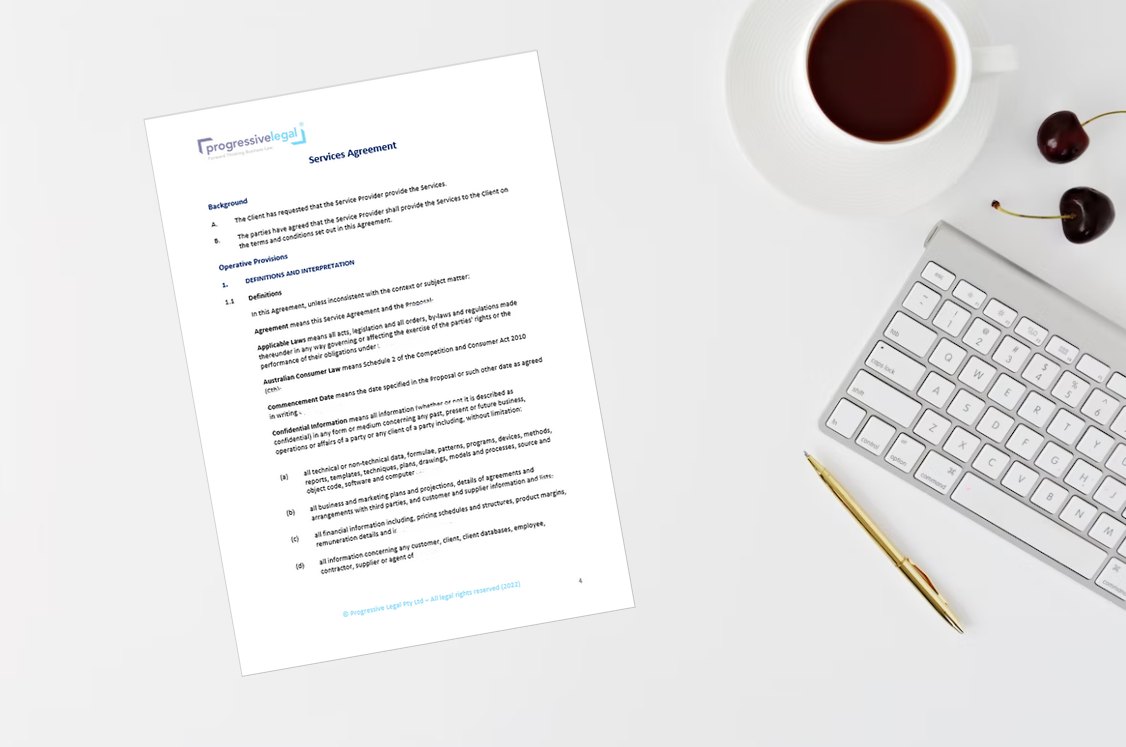06 Feb Master Services Agreement (MSA): Definition & Key Terms
 Author: Ian Aldridge, Progressive Legal
Author: Ian Aldridge, Progressive Legal

When you’ve got a growing business, it can be hard to keep track of all the legal contracts you need. One important document that many small business owners in Australia may overlook is a Master Services Agreement (“MSA”).
In this post, we explore the key elements of an MSA and provide some tips on how to draft one for your business in order to ensure smooth business practice and potentially limit your legal liability.
Need advice on creating a tailored and professional master services agreement?
Contact Progressive Legal for expert advice from our experienced commercial lawyers.
REQUEST OUR ADVICEWhat is a master services agreement (MSA)?
A master services agreement sets out the details and responsibilities of both the service provider and the customer. It covers things such as payment terms and timelines for the delivery of the product or service. It also serves as the basis for any future service contracts that you may enter into with that same customer. In other words, a MSA aims to prevent you having recurring clients constantly sign the same document when regularly engaging or using your services.
Australia’s business landscape is dynamic, with new competitors and opportunities popping up all the time. The MSA is a way to establish some legal parameters as to how you will interact with customers over the lifetime of your business relationship. Think of it as a roadmap that will guide your business relationships presently, and into the future.
An MSA typically covers three key areas: scope of services, payment terms, and dispute resolution. These are the foundations of all written contracts and should be clearly outlined in the MSA. However, it is also important to reflect on the nature of your business and identify other clauses/ issues which may be applicable in your MSA.
What are essential terms to incorporate in a master services agreement?
A standard form contract can be used to make the process of drafting an MSA easier. However, there are some critical elements that should be included regardless of the form you use.
Scope of Services
This section outlines the services that are to be provided and their respective cost. It also details who is responsible for the delivery of these services and how they should be measured. A clear scope prevents misunderstandings down the line.
Payment Terms
In this section, you will set out the payment terms for the services being provided. MSAs usually include a payment schedule that breaks down costs, timeline and payment deadlines. It is also important to include any late fees or additional charges in this section.
Liability and the Dispute Resolution Process
During the lifetime of your business, it is more than likely that you will experience a customer complaint or dispute. In such instances, it is important that your MSA considers the issue of liability in order to not open yourself up to considerable legal stresses and costs.
Further to this, the dispute resolution section outlines how any disputes between the two parties will be resolved. This could include arbitration, mediation or litigation. It is important to be clear in this section, so both parties know their rights and responsibilities in the event of a dispute.
Other clauses to consider in a master services agreement
A MSA can be carefully tailored to your business, and any other matters you wish to address should be considered when drafting the document. Some other clauses to consider implementing in your MSA include:
1. Intellectual Property Rights and Ownership
If the nature of the business relationship is one which involves the use of Intellectual Property, it is imperative that this is addressed in the MSA. For instance, it is important to consider existing and new materials. For example, if your client has material which is already owned or licensed by it (existing material), then you require permission to use such material during the performance of the service.
2. Termination
It’s extremely important to include a termination clause in your Master Services Agreement. This will help ensure that the agreement can be dissolved if one or the other party is not adhering to its terms. Some common reasons for termination include failure to pay, breach of contract, or a material change in circumstances.
3. Warranty
It is good business practice to incorporate warranty terms into your MSA, this will allow you to address the standards of performance expected of your business during the delivery of your products or services.
4. Management of Products and Services
It is important to identify how the delivery of the product or service will occur, and who is responsible for dealing with situations which have gone wrong.
5. Taxes
A MSA should consider the allocation of tax liability between the customer and service provider.
6. Jurisdiction of law
A MSA should explicitly identify which jurisdiction the agreement applies to.
7. Indemnification
Having indemnities allows you to consider the allocation of risk between you as the service provider, and the customer. However, indemnities can be complex and actually expose you to more legal liability so it is best to seek detailed legal advice on this.
8. Confidentiality
Many MSA’s contain confidentiality terms. Such terms are directed at the protection of certain information that may become available during the operation of the MSA. This includes, and is not limited to: personally identifiable information and private data.
Key takeaways
Progressive Legal has been working with small businesses in Australia to draft Master Services Agreements since 2016. We can provide expert and professional advice on how to create a comprehensive MSA and handle any legal issues that may arise. Call us today to take the first step in your business’ future.
Need advice on creating a tailored and professional master services agreement?
Contact us by giving us a call on 1800 820 083 or request our advice today.
REQUEST OUR ADVICEMaster Services Agreement: FAQs
What are some tips for drafting a Master Services Agreement?
Be Specific, But Flexible
An MSA should be specific enough to cover all the necessary details and issues outlined above, while also providing some flexibility. As your business grows and changes, you may find that the services you are providing or the terms of the MSA to need to be adjusted.
Provide for Review and Variation
The MSA should include a provision for periodical reviews and mutually agreed variation if needed. For example, you may want to review the agreement every six months or annually. This will help ensure that the agreement is up-to-date and reflects any changes in the business landscape or the services you are providing.
Are Master Services Agreements enforceable?
An MSA is a legally binding agreement, so it’s important to get help from a professional lawyer or contract attorney regarding drafting the document and or reviewing any MSA’s you may already have.
What you may think is clear language in the agreement may contain hidden interpretations and unfair contract terms with legal implications. A professional can help you navigate these complexities, ensuring that your MSA is comprehensive and legally sound.
Tailor Made Legal Documents
We can provide you with tailored Legal Documents in a number of areas including: Intellectual Property Law, Commercial Law, Privacy Law, Workplace Law, Corporate Law, and Litigation / Dispute Resolution.
Click here to request a fixed-price Legal Document and have a look at the range of different documents we can help you with.
- 01 February, 2024
- 18 January, 2024

Ian Aldridge is the Founder and Principal Lawyer Director at Progressive Legal. He has over 15 years experience in advising businesses in Australia and the UK. After practising in commercial litigation for 12 years in major Australian and International Law Firms, he decided to set up a NewLaw law firm in Australia and assist growing Australian businesses. Since then, he has advised over 2,500 small businesses over the past 6 years alone in relation to Intellectual Property Law, Commercial, Dispute Resolution, Workplace and Privacy Law. He has strived to build a law firm that takes a different approach to providing legal services. A truly client-focused law firm, Ian has built Progressive Legal that strives to deliver on predictable costs, excellent communication and care for his clients. As a legal pioneer, Ian has truly changed the way legal services are being provided in Australia, by building Legal Shield™, a legal subscription to obtain tailored legal documents and advice in a front-loaded retainer package, a world-first. He has a double degree in Law (Hons) and Economics (with a marketing major). He was admitted to the Supreme Court of NSW in 2005.






